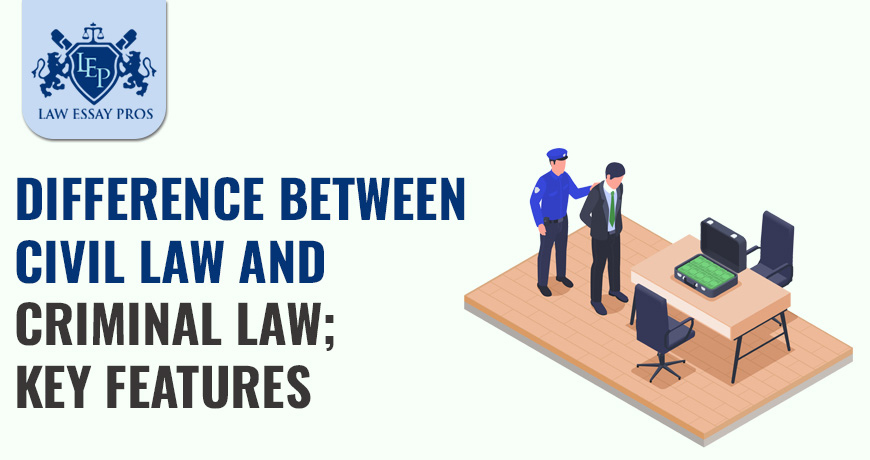
As a law student, you should know about two of the most important aspects of law: civil law and criminal law. Civil law and criminal law are two separate systems of law that set apart sets of laws and punishments. These two branches of law serve distinct purposes and operate under different principles. The law has differences in terms of punishments, cases, and judgments.
Law students usually find it difficult to study these two topics, and they get confused about writing assignments, thesis, dissertations, and essays, and they want help with law dissertations. That is why our law dissertation writing service UK has introduced its services to help law students understand the topics and help them with their dissertations.
Stay connected till the end to understand criminal and civil law thoroughly.
The Introduction Of Criminal And Civil Law
Criminal Law: Criminal law is a system of laws that defines criminal acts and how the government punishes people who commit them. It aims to provide justice by punishing those found guilty of crimes with fines, jail time, or community service,
Civil Law: The system of laws, rules, and regulations related to private relations between members of society is the main focus of civil law. It covers issues related to people, businesses, and the government.
How Criminal Law Differs From Civil Law
The Purpose
Civil Law: Resolving conflicts and compensating the harmed party are the main goals of civil law. Through financial compensation or other judicial relief like injunctions, it seeks to recover the injured party to full health.
Criminal Law: Criminal law exists to protect society by discouraging and punishing criminal activity, such as punishing those who are found guilty of crimes with fines or jail time. It aims to deliver justice.
The Parties Involved
Civil Law: The parties that are involved in civil cases are called plaintiffs and defendants. Plaintiffs are those who bring the case to the court, and defendants are those who are being sued. These cases usually involve businesses, individuals, or government.
Criminal Law: In criminal cases, the defendant (the accused) is charged by the state, which a prosecutor represents. Since crimes are viewed as a violation of the state or society, the government is considered the plaintiff in this case.
Burden Of Proof
Civil Law: In civil cases, the proof is based on a "preponderance of the evidence," which means that the plaintiff has to show the defendant's liability.
Criminal Law: The burden of proof is significantly higher in criminal cases. The accused must be proven guilty by the prosecution. This results in serious consequences that a criminal conviction carries.
Punishment Of The Defendants
Civil Law: Civil law usually involves some type of compensation for injuries or damages, resolving property issues, and settling other disputes.
Criminal Law: The defendant faces punishment through imprisonment and/or fines, with the death penalty applied in rare circumstances. Crimes are categorized into two main types: felonies and misdemeanors.
Rights Of The Accused
Civil Law: The protection provided to defendants in criminal cases is greater than that provided in civil cases. If they are unable to pay for an attorney, they are not entitled to one or to remain silent. They can, however, employ legal counsel.
Criminal Law: A fair and public trial, the right to remain silent, and legal representation, including court-appointed attorneys if they cannot afford one, are just a few of the many legal protections provided to defendants in criminal cases. In order to guarantee due process.
Legal Procedures
Civil Law: Civil cases typically start with the plaintiff filing a complaint, to which the defendant then responds. Through mediation or negotiation, these cases can be resolved out of court. A judge usually decides if they go to trial, though jury trials are occasionally an option.
Criminal Law: Arrests and formal charges filed by the prosecutor are typically the first steps in criminal proceedings. The defendant could be placed under arrest or released on bond. Pre-trial motions, trial, and sentencing are some of the phases that the case goes through. The verdict is frequently decided by a jury, particularly in serious cases.
Types Of Cases
Civil Law: Civil cases can include torts, family law cases, breach of contract disputes, equitable claims, landlord/tenant issues, and small claim cases.
Criminal Law: Criminal cases can include felonies and misdemeanors. Felonies are serious crimes that usually carry a jail sentence of at least one year, while misdemeanors are less serious offenses and usually include jail sentences of less than one year.
At Last
To understanding the distinctions between civil law and criminal law is essential if you are interested in a legal field or if you are a law student. Both laws aim to uphold justice, and they do so in different ways and for different purposes. If you are a law student, keep these differences in mind, and this will help you handle the difficulties of legal studies easily.
Our professional law dissertation writing services help students with law dissertations by writing a well-researched dissertation about criminal or civil law or any other topic. We also provide services for essays, assignments, thesis, and coursework. Subscribe to our page to get updates about every service.